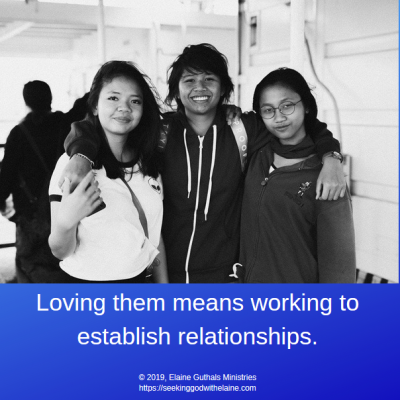But a certain Samaritan, as he journeyed, came where he was. And when he saw him, he had compassion.
Luke 10: 33 (NKJV)
Scripture: Luke 10: 30-37
Jesus told the Parable of the Good Samaritan to show people that we need to love others, regardless of diversity. For some, this takes them out of their comfort zone. The second devotion in the Called Out of Our Comfort Zones series, this devotion looks at which characters stayed in their comfort zones and who went outside of theirs.
Cliff Notes
- A lawyer initially asked Jesus how to inherit eternal life.
- Jesus’ response to the question “Who is my neighbor” was the Parable of the Good Samaritan.
- Even though the Good Samaritan had to have gone out of his comfort zone, he helped the victim where the religious leaders did not.
To read devotions in the Called Out of Our Comfort Zones series, click the appropriate button below.

Sometimes, we can have conflict with others because we are dealing with people who are totally different from us. We may have deep-seated reasons why we feel the way we do.
Jesus said the bottom line is we have to love each other.
Let's Put It into Context
Jesus told the Parable of the Good Samaritan to a lawyer who initially asked how to inherit eternal life. The lawyer did a good job of encapsulating what God expects when Jesus put it back on him.
“So he answered and said, “‘You shall love the Lord your God with all your heart, with all your soul, with all your strength, and with all your mind,’ and ‘your neighbor as yourself’” (Lk. 10 27 NKJV).
Whatever points the lawyer made with that answer, he lost with the follow-up question. Okay then, who is my neighbor (Lk. 10: 29)?
Jesus’ response was the parable. It may or may not have been a made-up story. Most of the time, we focus on the “just love them” aspect.
I think there is something else we can look at. I think each of the characters had to decide if they were staying in or going out of their comfort zones. I don’t think we always recognize just how hard that can be at times to go out of our comfort zones with other people.
The victim in the story sure wasn’t comfortable. He got beat up by thieves. He had to have been a Jew. It wouldn’t have made any impact on the lawyer if a Samaritan helped another Jew.
Three people come upon them, but helping the man means they have to get out of their comfort zones.
The Priest Stayed In
“Now by chance a certain priest came down that road. And when he saw him, he passed by on the other side” (Lk. 10 NKJV).
Since the man was a priest and he was going from Jerusalem to Jericho, we can assume that he was going home from his tour of duty. He may have been overseeing the sacrifices and offerings. Maybe it was his job this time to assist the people, either blessing them (Num. 6: 22-26) or teaching them (Deut. 31: 9-12). Or he might be trying to determine the will of God (Ex. 28: 30).
If the priest was making the round trip daily from his home to the temple, maybe he didn’t want to take a chance the victim would die. This would have made Him unclean and forced him to not fulfill his duties.
But we would think that a priest would show compassion to his countryman. This man would have had a direct connection with God. This was a guy who had respect status, and prestige.
So, the priest not only didn’t stop, but he also stepped all the way around to the other side of the road. He made it blatantly obvious that he didn’t want anything to do with the poor man.
If his comfort zone was the temple, maybe the priest thought he was off duty from compassion? This wasn’t in his job description?
But you would expect a priest to know the law better than the average joe. He would know that it was okay to do the “thou shalt nots” when it meant saving a human life.
The Levite Stayed In
“Likewise a Levite, when he arrived at the place, came and looked, and passed by on the other side” (Lk. 10: 32 NKJV).
The Levite did better. He at least checked on the victim. But he didn’t help either.
Let’s look who the Levite was. The Levites were descendants of Levi, but not necessarily of Aaron. They were not priests; the way I read it is they were more of assistants or administrators. They were the lowest rung in the hierarchy of priests.
In my research I read where the lawyer might have been a Levite himself. The Levite in the story could have, however, represented the average joe.
Whoever the Levite was, he choked whatever compassionate urge he had to even check on the victim. He still didn’t want to step out of his comfort zone and actually help the poor guy.
The Good Samaritan Went Out
“But a certain Samaritan, as he journeyed, came where he was. And when he saw him, he had compassion. So he went to him and bandaged his wounds, pouring on oil and wine; and he set him on his own animal, brought him to an inn, and took care of him. On the next day, when he departed, he took out two denarii, gave them to the innkeeper, and said to him, ‘Take care of him; and whatever more you spend, when I come again, I will repay you.’ So which of these three do you think was neighbor to him who fell among the thieves?”
Wow. Did you read all the Samaritan did for this guy he had never met before? This guy that, if he hadn’t been beaten up and half dead, would have looked down on him?
Can we talk out of our comfort zone? I wonder if it is going through his mind, “Does this dude even want me to touch him? Is he going to snub me when he wakes up?
Remember, this was one of those yucky Samaritan guys. While it had previous been associated with the Northern Kingdom, in Jesus’ day, Samaritans were the descendants of Jews who had married Gentiles.
Can we talk how much money the Samaritan spent on someone who may not even be thankful?
The dude shelled out mega bucks in a situation that could have gone bad quickly.
Making the Connections
The lawyer’s question was to determine how we gain eternal life. Jesus’ response was that we are to love God and others. We show we love God by loving others.
It is easy to say we love somebody. Putting that love into action can be hard. Putting that love into actions we are unfamiliar or uncomfortable with and ministering to people who are different than those who inhabit our normal sphere can be downright difficult for some.

Diversity and inclusion are the buzzwords today. Diversity can take many forms. There is diversity in culture, values, assumptions, and beliefs (including religious and political). There is diversity in economies, languages, music, and art. That just scratches the surface.
Jesus was telling us with the parable that we need to set aside all the diversity issues and just love everyone with whom we come in contact. By loving others (the second commandment), we are showing others that we truly love God (the first commandment)”.
We need to act positively with others, even if that is outside our comfort zones. Yes, it will take a conscious effort, but it has to start within our hearts. It must be genuine.
How Do We Apply This?
We step out of our comfort zones when we truly love our neighbors, not just tolerate their opinions and actions. Loving them means helping them to grow into the people God would have them be.
Loving them means working to establish relationships. It means listening when they need an ear. It means doing what we can to help a hurt they have. It means not judging them, but not condoning their actions that are worldview, not Godview.

Believers must be ready to love any person to whom God calls us to witness. We must be ready to build a relationship with those who are different than us so that we can expand His kingdom.
Loving Father. You have called us to work to expand Your kingdom. We can only do this by building relationships with those You put in our path. Help us to lovingly, truthfully reflect Your love to them. Help us to work through our weaknesses. May we always relay on You because it will be You doing the convicting, not us. We pray that we will always do Your will. Amen.
What do you think?
Leave me a comment below (about this or anything else) or head over to my Facebook group for some interactive discussion.
If you have not signed up for the email daily or weekly providing the link to the devotions and the newsletter, do so below.
If God has used this devotion to speak with you, consider sharing it on social media.
Pingback: Out of James and John’s Comfort Zones – Seeking God with Elaine
Pingback: How Do Believers Love Others? – Seeking God with Elaine
Pingback: How Are Disciples of Christ to be Merciful to Others? – Seeking God with Elaine
Pingback: Submitting to Love – Seeking God with Elaine